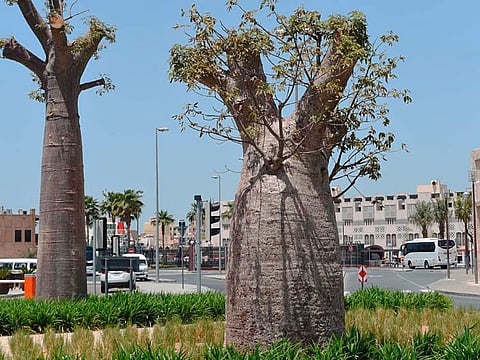Baobab trees in Dubai? See with your own eyes
Who planted these strange-looking trees in the heritage area?

Dubai: Have you seen those strange-looking trees that have come up in Al Seef, Dubai?
Residents and tourists are curious to know what species of tree it is — and where it has come from. But, who planted these trees in the heritage district of Dubai remains a bit of a mystery.
Mahmoud Assadullah, a Saudi national who owns a garment shop in the nearby Bastakiya Heritage Area, said he saw those trees for the first time in the small roundabout towards Al Seef, the waterfront promenade by Meraas.
“I have been doing business here since 1990. I had never seen them before. They look strange and nice. But I don’t know what trees they are.”
'Replanted overnight'
Aleem Khan from Pakistan, who works at The Pashmina House in Al Seef, said he did notice the trees near his shop. “They were not there when we opened the shop six months ago. They got replanted here overnight.”
Chinese tourist Xiao Fei said she found the trees very interesting and wanted to know more about it.
“But there is no introduction given except for some numbers on the trunk.”
Both Khan and Fei said whoever planted the trees should help the public know about these trees that do not look native to the UAE.
However, Manu Mirpuri, a retired Indian expat running a textile shop in the Textile Souk, said he believed those trees are from Africa since he had seen them while he visited his daughter in Dar es Salaam in Tanzania.
So, what are these trees?
As to who planted the trees remains unknown, an expert from Dubai Municipality’s Parks and Horticulture Department identified the tree as Adansonia grandidieri, sometimes known as Grandidier’s baobab.
“This is the biggest and most famous of Madagascar’s six species of baobabs.”
Known to live for thousands of years, baobabs are known as Africa’s tree of life.
They are also called as bottle tree (due to the shape of the massive cylindrical and thick trunk that can reach up to 30 metres in circumference) and upside-down tree (due to the root-like appearance of their tangled branches).
“This imposing and unusual tree is endemic to the island of Madagascar, where it is an endangered species threatened by the encroachment of agricultural land,” stated the horticulture expert.
When contacted, Dubai’s veteran wildlife expert Dr Reza Khan said: “For sure, these are baobabs. As the horticulture department said, these are from Madagascar. Each tree looks like minimum a century-old and I have no clue from where these have been imported. Whoever has brought them here has taken a lot of effort and spent a lot of money.”
He said there is another pot-shaped baobab species called Adansonia digitita in Dubai Safari.
“In Safari, we have about 20 small trees that are real and five other much taller trees that are artificially made. They look like the ones that you showed from Al Seef.”


